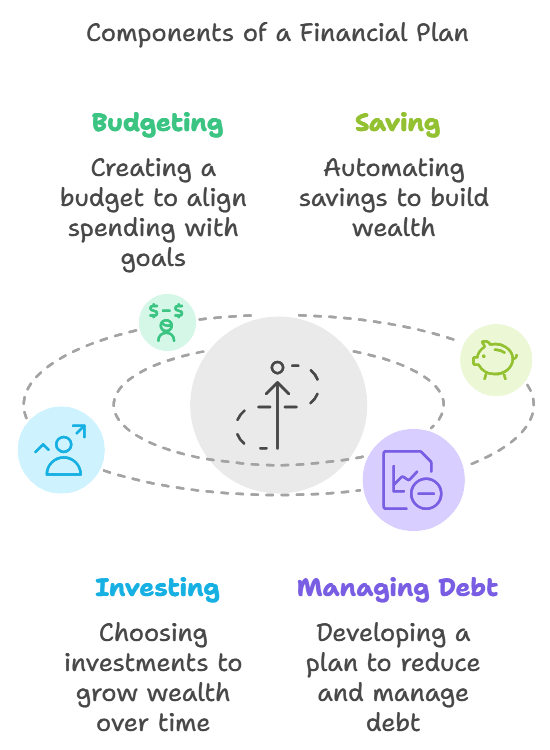When people think of financial planning, they might picture complex charts, investment portfolios, or sitting in an office with a financial advisor. But financial planning is actually something everyone can do, and it’s more straightforward than it seems. At its core, financial planning is about taking a detailed look at your current financial situation—your income, spending, debt, and savings—and making a plan for the future. Whether you’re just starting out or looking to fine-tune your finances, having a plan can make a world of difference.
You can create a financial plan on your own or with the help of a certified financial planner. If you’re considering major steps like consolidating debt or managing unexpected expenses, looking into options like personal loans online can be part of your strategy. Let’s dive into what financial planning really involves and how you can approach it from a fresh angle.
Why Financial Planning Matters
Financial planning isn’t just about numbers; it’s about creating a path that leads to the life you want. Without a plan, it’s easy to get stuck in a cycle of spending and saving without really knowing if you’re on the right track. A good financial plan gives you clarity and direction, helping you make informed decisions that align with your goals.
For example, maybe you’re dreaming of buying a house, starting a business, or simply enjoying a stress-free retirement. Whatever your goals are, financial planning can help you figure out the steps you need to take to get there. It’s about making sure your money is working for you, not against you.
Taking Stock of Your Current Situation
The first step in financial planning is understanding where you stand right now. This means taking a close look at several key areas of your finances:
- Income: How much money do you have coming in each month? Include all sources of income, like your salary, side gigs, or any other money you receive regularly.
- Spending: Where is your money going? Track your expenses to see how much you’re spending on essentials like rent, utilities, and groceries, as well as non-essentials like dining out and entertainment.
- Debt: List all your debts, including credit cards, student loans, car loans, and any other personal loans. Note the interest rates and monthly payments for each one.
- Savings: How much do you have in savings? Include your emergency fund, retirement accounts, and any other savings you’ve set aside.
Understanding these components gives you a clear picture of your financial health. It can also highlight areas where you might need to make changes, like cutting back on spending or focusing on paying down high-interest debt. If you live in Singapore, your day-to-day costs and debt rates can shape which changes make the biggest impact. When you need quick access to funds while rebuilding your score, it can help to apply for a bad credit loan in Singapore through a lender that clearly explains terms and repayment expectations. Make sure you compare the total repayment amount and confirm the monthly payment fits your budget before you commit.
Setting Financial Goals
Once you have a clear view of your current situation, the next step is to set some financial goals. What do you want to achieve with your money? Goals can be short-term, like saving for a vacation or building an emergency fund, or long-term, like buying a home or retiring comfortably.
Setting specific goals helps you stay motivated and gives you a target to work toward. Make sure your goals are realistic and measurable. Instead of saying, “I want to save more money,” try something more concrete, like, “I want to save $5,000 for an emergency fund in the next year.”
Creating a Plan to Reach Your Goals
With your goals in mind, it’s time to create a plan to achieve them. This plan will include a combination of budgeting, saving, investing, and managing debt.
- Budgeting: Start by creating a budget that aligns with your goals. This means setting limits on your spending in different categories and ensuring you’re saving money each month. Your budget is your roadmap—it helps you allocate your money in a way that supports your goals.
- Saving: Decide how much you want to save each month and automate the process if possible. Setting up automatic transfers to a savings account can make saving easier and help you build your savings without having to think about it.
- Investing: Investing is an important part of growing your wealth over time. Whether it’s contributing to a retirement account or investing in the stock market, choose investments that align with your risk tolerance and long-term goals.
- Managing Debt: If you have debt, create a plan to pay it down. This might involve prioritizing high-interest debt first or considering options like personal loans online to consolidate multiple debts into a single, more manageable payment.
Reviewing and Adjusting Your Plan
Financial planning isn’t a one-time task; it’s an ongoing process. Life changes, and so will your financial situation and goals. It’s important to review your financial plan regularly to see if you’re on track or if adjustments are needed.
For example, if you get a raise at work, you might decide to increase your savings or pay off debt faster. On the other hand, if you have an unexpected expense, you might need to adjust your budget temporarily. The key is to stay flexible and make changes as needed to keep moving toward your goals.
Do You Need a Financial Planner?
While you can definitely create a financial plan on your own, some people prefer to work with a certified financial planner (CFP). A CFP can offer professional advice, help you create a more detailed plan, and provide strategies for reaching your goals. They can also give you an objective perspective and keep you accountable as you work toward your financial future.
However, working with a financial planner isn’t necessary for everyone. If you feel comfortable managing your finances and creating a plan on your own, go for it. The most important thing is to take action and start planning for your future, whether you decide to go it alone or seek professional help.
Conclusion: Taking Charge of Your Financial Future
Understanding financial planning is about taking charge of your financial future. It’s about evaluating where you are now, setting goals for where you want to be, and creating a plan to get there. Whether you’re looking to pay off debt, save for a big purchase, or invest for the future, having a solid financial plan can make all the difference.
Remember, financial planning is not a one-time event. It’s a process that evolves as your life changes. The important thing is to start where you are, make adjustments as needed, and keep working toward your goals. And if you’re considering options like personal loans online as part of your strategy, make sure they fit into your overall plan. Financial planning is all about making informed choices that support your well-being and help you create the life you want.


